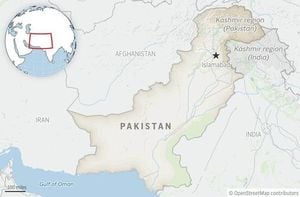On February 1, 2025, the Trump administration plans to impose 25% tariffs on all products imported from Canada and Mexico, which could lead to soaring prices for American consumers across various sectors. Experts have hinted at potential price increases of up to 70 cents for gasoline and significant hikes for groceries and automotive goods. The tariffs target two of the U.S.'s largest trading partners, impacting the lives of many consumers who depend on goods from these countries.
The administration announced these tariffs, citing issues such as immigration and drug trafficking. President Donald Trump stated, "We’ll be announcing the tariffs on Canada and Mexico for a number of reasons. Number one is the people who have poured..." This declaration has already sent the Canadian dollar and the Mexican peso tumbling, with Canada’s currency dropping by 0.4% and Mexico’s by 0.6% against the U.S. dollar during pre-market trading.
Economists warn the ramifications will be extensive. Jason Miller, a professor of supply-chain management, noted, "The scary thing is the list of products is very, very long." Tariff measures of this magnitude could affect prices on everyday household items like tomatoes, tequila, and auto parts. For gas, which relies heavily on crude oil imports from both countries, analysts anticipate prices could climb between 40 to 70 cents per gallon. Timothy Fitzgerald, another expert, remarked, "You could definitely be looking at 50 cent-a-gallon increases..." highlighting the scale of potential impact, especially as seasonal demand for gasoline ramps up.
Food imports are also expected to be hit hard. The U.S. imports more than $38 billion worth of agricultural goods from Mexico annually, making it the top supplier. Approximately 90% of avocados consumed in the U.S. originate from Mexico, along with a variety of other fruits and vegetables. Miller elaborated on the situation: "You’d certainly expect to see an impact on prices," emphasizing how dependent American consumers are on imports from south of the border.
On the automotive front, the relationship between the U.S. and its neighboring countries is even more entrenched. Together, Canada and Mexico account for nearly half of the motor vehicles imported by the U.S. industry, and tariffs could disrupt existing supply chains, causing prices to spike even for domestically manufactured vehicles. Robert Lawrence, a trade and investment professor, stated, "The operations of auto companies on both sides of the border will be hugely affected by these tariffs." This disruption would not only burden consumers but also complicate U.S. manufacturers' strategies to remain competitive.
The political intentions behind Trump’s tariffs have raised eyebrows as he expresses concerns over subsidies provided to Canada and Mexico, and the influx of drugs entering America. The announcement has Mr. Trump's backers and critics alike pondering the broader strategy embedded within this economic move. Bob Savage, head of markets strategy and insights at BNY, shared his thoughts on the potential volatility the market could face, illustrating the uncertainty surrounding Trump’s policies: "Investing requires greater clarity about the scope, size and reach of Trump's tariffs." This clarity is especially pertinent, as industries scramble to recalibrate their strategies to remain viable amid shockwaves from impending additional parking costs.
Canadian officials are bracing for the imminent reality of these tariffs. Foreign Minister Mélanie Joly warned of dire consequences if oil is included: "Canada would be forced to turn to oil from Venezuela if tariffs imposed on oil exports," she stated, underlining the delicate balance of energy imports between the U.S. and Canada. With lesser options available, this could signal complicated new dynamics within North American trade relations.
Potential negotiating tactics are anticipated, as some analysts view the tariffs as merely leverage for future discussions, with Mohit Kumar from Jefferies commenting on the possibility of subsequent negotiations leading to some tariffs being rescinded. "Even if Trump does go ahead with the tariffs, it will be followed by intense negotiations and eventually some portion of tariffs will be pulled back," he indicated, expressing hope for moderation.
This upcoming tariff situation showcases the intersection of economics and politics, underlining how enduring consequences can ripple across local and international markets. The impending decisions could transform trade relations with Canada and Mexico, amplify inflationary pressures on the American economy, and complicate economic recovery efforts stemming from global instability.
Overall, our insights reveal the necessity of monitoring shifts stemming from these tariffs and seeking clarity from policymakers as the relationship between the U.S., Canada, and Mexico takes on new dimensions. Understanding these changes will be imperative for consumers, economists, and businesses alike as they navigate the uncertain waters of international trade.



